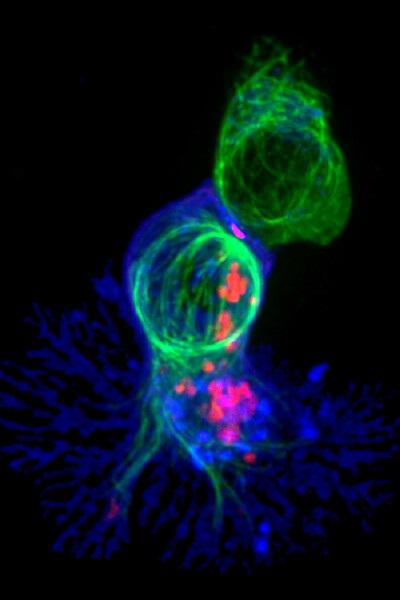Immunotherapy Combination Improves Outcomes in Advanced Kidney Cancer
An immunotherapy agent combined with a tyrosine kinase inhibitor drug significantly improved progression-free survival and reduced the risk of death compared to a single agent treatment in advanced kidney cancer patients, according to first results of a phase 3 clinical trial. The pivotal study could lead to a new treatment option for patients with metastatic kidney cancer.
Patients receiving the combination had a higher response rate and superior quality of life, said investigators from Dana-Farber Cancer Institute reporting on the CheckMate -9ER trial. The results were presented in a Presidential/Plenary Symposium of the European Society for Medical Oncology (ESMO) Virtual Congress 2020.
The first author of the report, Toni Choueiri, MD, Director of the Lank Center for Genitourinary Oncology at Dana-Farber, said the combination of nivolumab (OPDIVO®) and cabozantinib (CABOMETYX®) achieved significant improvements across all efficacy endpoints, including overall survival, in previously untreated patients with metastatic renal cell carcinoma. The combination was tested against sunitinib in a randomized trial involving 651 patients.
Nivolumab and cabozantinib have each been approved by the U.S. Food and Drug Administration in certain patients with advanced kidney cancer, but the combination has not yet been approved. A supplemental New Drug Application has been submitted to the FDA.
Choueiri said, “I’m quite encouraged with the results.” The combination treatment “demonstrated meaningful efficacy benefits with consistent effects observed across pre-specified subgroups,” he said. “These results, along with manageable toxicity and superior health-related quality-of-life, highlight this regimen’s potential importance among combinations of immunotherapies and tyrosine kinase inhibitors.”
Nivolumab is a PD-1 checkpoint inhibitor designed to help the body’s immune system recognize and attack cancer cells. Cabozantinib is a small-molecule inhibitor of tyrosine kinases including c-Met and VEGFR2, which are implicated in cancer cell growth. Cabozantinib may also counteract tumor-induced immunosuppression, say the investigators.
The CheckMate -9ER trial data showed that the combination of nivolumab and cabozantinib reduced the risk of death by 40% compared with sunitinib. Median overall survival was not reached in either group, at a median follow-up of 18.1 months. In patients receiving the combination, median progression-free survival – the study’s primary endpoint – was doubled compared to those who got sunitinib alone, 16 .6 months vs 8.3 months. The median duration of response was 20.2 months for the combination, vs 11.5 months for sunitinib.
In addition, twice as many patients receiving the combination had a response compared to sunitinib – 56% vs. 27% – and 8% achieved a complete response vs 5% for sunitinib.
The combination was well-tolerated, according to the investigators with less than 5% of patients having to completely discontinue both nivolumab and cabozantinib due to side effects. Patients treated with nivolumab plus cabozantinib reported significantly better health-related quality of life than those treated with sunitinib at most time points, according to a kidney symptom index.
The five-year survival rate for patients with advanced or late-stage metastatic kidney cancer is only 12%, according to the American Cancer Society’s 2020 statistics. “This is a pivotal study,” said Choueiri. “We hope to bring this drug combination to approval so our patients presenting with metastatic renal cell cancer have another option.”
This work was supported in part by Bristol Myers Squibb and Ono Pharmaceutical Co. and co-funded by Exelixis, Ipsen and Takeda Pharmaceutical Company Limited. Choueiri is supported in part by the Jerome and Nancy Kohlberg Chair at Harvard Medical School. Choueiri’s disclosures include receiving research funds from AstraZeneca, Bayer, BMS, Cerulean, Eisai, Foundation Medicine Inc., Exelixis, Ipsen, Tracon, Genentech, Roche, Roche Products Limited, GlaxoSmithKline, Merck, Novartis, Peloton, Pfizer, Prometheus Labs, Corvus, Calithera, Analysis Group, Takeda. T. as well as a consulting or advisory role for AstraZeneca, Alexion, Sanofi/Aventis, Bayer, BMS, Cerulean, Eisai, Foundation Medicine Inc., Exelixis, Genentech, Heron Therapeutics, Roche, GlaxoSmithKline, Merck, Novartis, Peloton, Pfizer, EMD Serono, Prometheus Labs, Corvus, Ipsen, Up-to-Date, NCCN, Analysis Group.
This study was presented in the ESMO Virtual Congress 2020, September 19, 2020: Presidential Symposium I
Nivolumab + cabozantinib vs sunitinib in first-line treatment for advanced renal cell carcinoma: first results from the randomized phase 3 CheckMate 9ER trial
Media Contacts
If you are a journalist and have a question about this story, please call 6176324090 and ask to speak to a member of the media team, or email media@dfci.harvard.edu.
The Media Team cannot respond to patient inquiries. For more information, please see Contact Us.
